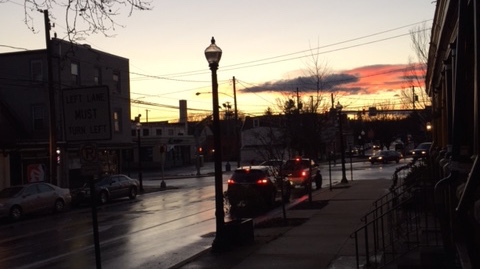There’s a chaotic angst broiling in America these days. Facebook and Twitter basically blew up as the results from Super Tuesday became clear and He Who Must Not Be Named was declared the winner in many states, his path to the presidency made straight(er). You can feel the tension gathering tighter, like a spring pulling apart.
This fear shouldn’t surprise us. After all, the world profits on it. Our fear (of being hurt, of not having what our neighbor has, of being left out) makes the economic world go round. You can’t sell something to someone who is content with what they have, so we’re pummeled with the fear of being hungry or not having the best car or not having enough sex with the right kind of people. There’s the fear that refugees will destroy our economy, the fear that ISIS is in our backyard. If we listen to those fear-spewing stations long enough, we start to believe them.
In the mean time, our culture continues to feed us fear and angst and watches the bottom line go up. We devour it 24/7 in the news and on the radio and in our social media feeds, and we are sated, but we can’t stop eating it up.
More and more words.
More and more stuff.
More and more fear.
* * * * *
One of my Lenten practices is reading the book of Luke. I was driving down to see a client who lives in the southern end of Lancaster County, and as I drove those long slivers of road that run along the edges of fields and woods, I listened to chapter 24. It’s the story of the events that come after Jesus’ death.
But really, it’s the story of chaos.
From the other gospels we know that all kinds of chaotic things happened when Jesus died. There was a storm, a splitting curtain, and formerly dead people walking the streets of Jerusalem. There were angels and frightened guards and an empty tomb. There were arguments about what had happened. There was uncertainty and disappointment.
There was a lot of disappointment.
The one person they had hoped would lead them into a new kingdom was dead. Now what?
Then, in the midst of these chaotic days, two travelers walk from Jerusalem to Emmaus, a village seven miles outside the city. A third man joins them, and they tell him the story of all that is happening, all the fear, all the disappointment, all the chaos. This third man, it turns out, was Jesus, resurrected.
What jumped out at me the most about their interaction with Jesus was that he did not use this opportunity to promise them success, or wealth, or even a worldly kind of peace that might have calmed the turmoil in the land around them. He didn’t, in other words, promise them that everything would turn out okay. The pivotal moment of their meeting didn’t involve him rallying them to overthrow Rome or put the Pharisees in their place, once and for all.
No.
The pivotal moment of their meeting came when he sat down with them and picked up the bread. He blessed it, he broke it, and he gave it.
* * * * *
I once heard a sermon by Henri Nouwen in which he talked about how many times Jesus was described as blessing bread, breaking it, and giving it. Nouwen goes on to suggest that this is the life of the true disciple of Christ, that all this handling of bread was actually Jesus foreshadowing what he would do, and what he would ask us to do.
We are blessed.
We are broken.
We are given to others.
* * * * *
These are chaotic times, no doubt. Sometimes I wonder if my generation has ever seen anything quite like it. But it is precisely the unrest and the fear that requires us to rediscover our foundation as sons and daughters of God.
Be blessed.
Be broken.
Be given.











